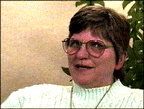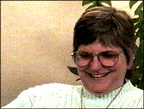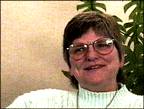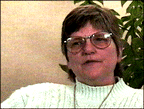![]() Listen
to Linda share a cancer experience in her own words. (1,092 K .au
file)
Listen
to Linda share a cancer experience in her own words. (1,092 K .au
file)

Linda was 49 years old when she was diagnosed with breast cancer. After considering her options, Linda chose not to have treatment. She continued to write and finished her first novel which was published in January, 1995.

Linda felt guilty that she may have caused her cancer. Then she felt confused because the professionals did not seem to have a clear explanation of her treatment.

Linda considered the treatment options available to her and chose none. She did not see an advantage to chemotherapy. Her choice was to live each day.

Linda plans to live until she dies. Since her diagnosis, she has published her first novel and finished writing her second. She took a solo 10,000 mile car trip to the west coast and experienced things she had always wanted to do. She is working on her third novel.
Linda's Introduction: Feeling guilty is common
There's a lot of people out there who really believe, you know, if
you come up with cancer or something you must have some
unreconcilable resentment issues, or an inability to express
yourself. Like Woody Allen says, "I don't get angry, I grow tumors."
In the reading I've done since, I can see that its really quite
universal that people who are told they have cancer feel they caused
it, and feel guilt for it. And any type of guilt is always painful
and uncomfortable.
Linda's Introduction: I'm responsible for my choice
We will certainly get in touch with what it is we truly believe or
have faith in at a time like this. If its the medical profession, we
will probably do whatever they tell us, and not take responsibility
ourselves for the decisions we make. But today, I choose to make my
own decisions. I know if I would run the risk of chemo and it didn't
work, I would be really angry. But the one person I'd have to be
angry with would be me.
Linda's Introduction: I don't ask how long
I have been absolutely disgusted with the number of people who
have asked me how long I have to live, particularly in the medical
profession. As if a nurse or a doctor cannot believe I haven't asked
somebody, and I haven't asked because there's no way I'd believe an
answer. If I could get an answer from the clouds and say, "Hey God,
how long have I got?" maybe I'd buy that. But other than that, I'm
not going to buy somebody's decision on how long I have to live.
Linda's Introduction: The freedom is delightful
I don't have any children at home. I'm not married. I'm not even
involved in a romantic relationship. I don't have anybody saying
"You've got to do this for me," which is delightful because I can do
what I want. You can't be in denial. I might live, and I might die.
But if the odds are that if I don't do chemo it'll just keep growing
and I will definitely die, then I'd better realize that's what I'm
doing. But I think I know that.
Linda's Introduction: I don't hate my body
I've come to decide not to take any conventional treatments
regarding breast cancer, but I do not hate my body. You know, I'm
okay with it. Where I worry is about somebody who was told they had
cancer, and to hate part of their own body and feel that their body
had been invaded by a real enemy, when I think we all have cancer
cells all the time.
Linda's Introduction: If I could be two people
What I would really find interesting is if I could split off and
be two people, hand one over to the medical community while I go on
and live my life. And then at the end, we could compare notes, which
one lived longer, which one had more fun. Let's compare a little
quality of life. If somebody told me that I have to go through six
months of hell right now and that would give me five more years, and
if I didn't do six months of hell right now I'd be dead in a year and
a-half, maybe I would chose to go through six months of hell. But
unfortunately, nobody can give us that information.
![]() Return
to Linda's Outline
Return
to Linda's Outline
Linda's Diagnosis: I thought I caused it
I was in a head-on collision in 1986, and subsequently, my chest
turned black and I thought then that I would someday have breast
cancer. But when I was told, I felt very guilty and felt I had caused
it. And I was honest with the nurse and she told me that trauma does
not cause cancer. I later thought that because I didn't have regular
check-ups after I'd been sent to a surgeon regarding my right breast,
once again I was at fault. But then it turned out to be my left
breast that was in question this time. So it was a real relief for
me.
Linda's Diagnosis: I've dealt with trauma before
When we face any trauma we have to go through these series of
feelings. We'll get angry and then we'll have grief feelings. Because
I've dealt with other traumatic issues, like I lost my brother when
he was 28. My mother just a couple of years ago. Maybe today I can go
through them far more quickly than I used to. So even the night that
I realized I had cancer in the lymph nodes, it shook me up for about
five minutes and then I went back to watching the movie I had rented.
Oh well! What are you going to do about it, you know?
Linda's Diagnosis: I was in a panic
I was in like a panic from the minute I was told I had to have a
mastectomy, I believed it, wanted to get it over with and get on with
my life. When I finally saw the surgeon, he never said anything about
a mastectomy. I Was told to come back to the office on Monday and I
wanted to know then do I pack a bag and am I going right to the
hospital, or do I have to come back here? So now its been twelve days
since I was told I had to have a mastectomy and it was confirmed that
both tests were positive. It was not only in the breast, there was a
ductal cancer all over the breast, and it was also in the lymph
nodes.
Linda's Diagnosis: The doctors recommended chemo
I went to an inter-disciplinary conference where there was
radiation specialists, and a chemotherapy specialist, and oncologist.
And the three of them had a conference on my case and came up with
the recommendation that I have chemo. The surgeon and the attendants
at that time said if we tell you that we'll do a mastectomy now, that
will be good news, and that would be after chemo. They knew for sure
that it was in more than lymph node, and I, of course, could feel
before they did. A friend has since told me that "It is not an act of
generosity to promise tomorrow at the expense of today," and I agree
with that.
![]() Return
to Linda's Outline
Return
to Linda's Outline
Linda's Decision: I'd seen the effects of chemo
I knew I wouldn't go along with chemo. I walked a girlfriend
through chemo and radiation for cancer a few years ago. She was in
treatment for ten months when she died. It was a real rough road. The
quality of her life was no where for ten months and then she died and
I wasn't going to let them do that to me.
Linda's Decision: There will be pain
It is frightening to think that down the road there might be
excruciating pain. I understand the Hospice program can't really help
you until some doctor says you only have six months to live. A nurse
told me that and suggested that I call them immediately. And
somewhere down the line I will probably have to seek help regarding
pain. That's probably who I would call, it would be Hospice. To die
with some dignity, if that's where I'm going, and we all are sooner
or later, you know.
Linda's Decision: A friend was upset
She was quite upset about it I guess. She finally put her thoughts
down on paper and by then she had done some reading. And a friend of
hers had given her an article stating that women should be told by
their doctor's that it is an option to do nothing. That they can make
a decision to not make a decision for one week. I thought it was wild
on my own part to be so accepting of the idea of a mastectomy for
twelve whole days. I have been told by a number of people I should
get second opinions. There comes a time when we have enough
information. Make a decision, you know. And that's mine.
Linda's Decision: They suggested mastectomy again
When I made the decision not to go along with chemo, I received
another call from a surgeon suggesting the mastectomy idea again, but
I said no, I'm not going to go back to that. Then he said that the
tumor would probably grow right out of my chest. Despite the fear a
statement like that can invoke, I said "Well, see ya," and since I've
had nothing to do with medical people.
![]() Return
to Linda's Outline
Return
to Linda's Outline
Linda's Recovery: Living versus trying to live
I know the difference today between living and trying to live, and
I feel sorry for anybody who has been promising themselves that next
year, or when I can retire, then I'm going to live. There's got to be
an awful lot of panic if somebody tells you you have cancer and you
feel you haven't lived yet. Or there's a whole lot of life issues you
haven't resolved, if you haven't told certain people you love them
enough, often enough. If you haven't told them you're sorry enough.
But I've been really grateful because I have dealt with things like
that through being in recovery in a twelve-step program.
Linda's Recovery: A Journal Helped Me Go On
I'm a writer. I'm in the process of writing another book. But I
found that my head was getting so full of facts, all this cancer
stuff, that I didn't have room for other things. So I needed to do a
journal so that I could assure myself, well, that I won't forget, or
if I need to go back on some of the information, I've got the date. I
have the source. And that left room in my head to go on with my life.
So I would highly suggest for somebody to put down their thoughts,
their experiences, and their feelings.
Linda's Recovery: Some people beat the odds
Please make friends with your cancer. Don't hate yourself. It's
not something green and fuzzy like growing on an orange that you have
to despise yourself for. There are exceptional people out there,
people who have beat the odds. They live. Read about them. There's
not a whole lot done regarding the quality of life they live. You
know, they may later be tagged as having "well behaved cancer." When
it's actually their spirituality, their peace of mind, their generous
loving, giving nature that has caused them to continue. The cancer's
probably having so much fun that it chooses to go right along with
them and not kill them.
Linda's Recovery: Friends are important
I would highly recommend that anybody who does not have a support
group, find one. Find a place where you can be yourself. Be real, be
honest. I feel very lucky in being in recovery for six years and
developing a network of friends. Some have been quite upset with me,
that I would choose not to go with treatment. I'm lucky because my
friends can tell if they're angry with me. My friends are also quite
accepting. They recognize where they have power and control and where
they do not. But it takes some effort. It takes being in touch with
our own feelings and then to be able to pass them on and express them
to somebody we care about. Because once they understand you, they're
even more supportive.
Linda's Recovery: I have things to do
I'm 49. I have a book to be published this year, it'll be my
first. I have three more in the hopper. I hope someday that they'll
be published. Of course, that gives me a sense of immortality, but
hopefully the love of friends, that'll keep me alive whether I'm here
or not. First I want to finish my book, then I want to explore some
country. Since I want to see the Grand Canyon and a few other things
out west, then I plan to come back and do whatever's next.
![]() Return
to Linda's Outline
Return
to Linda's Outline